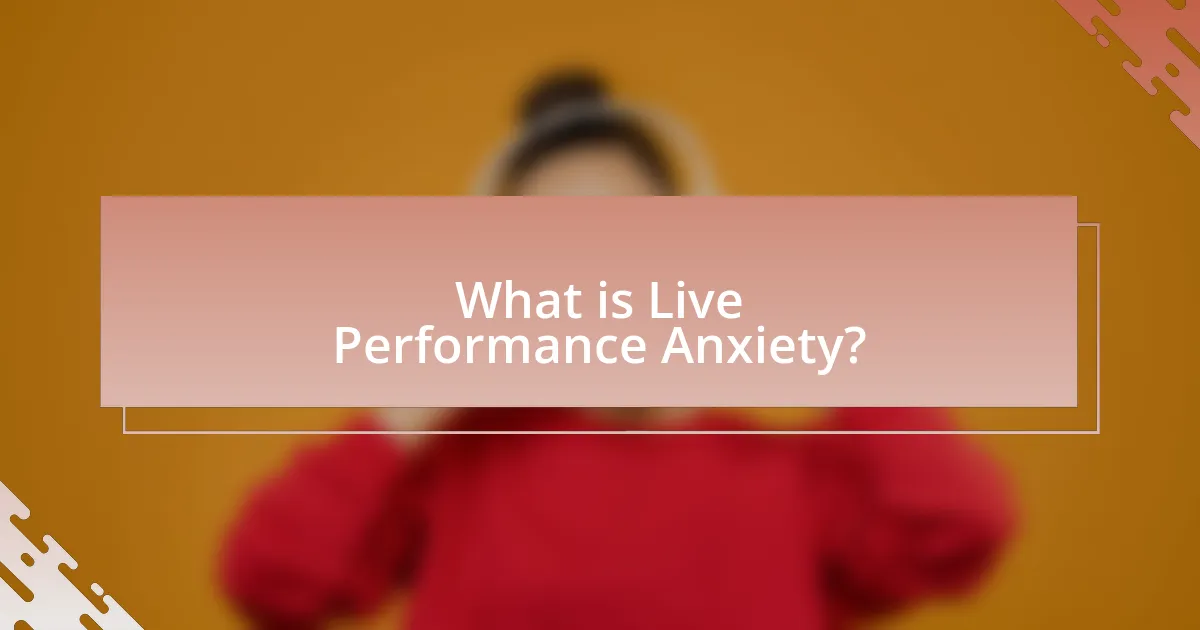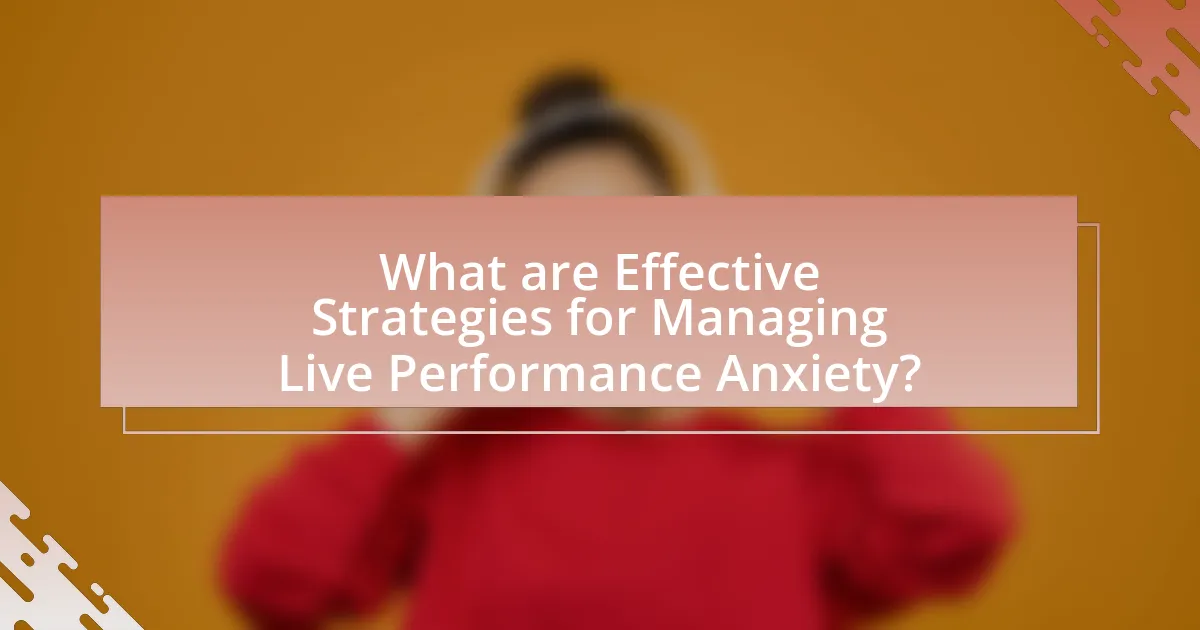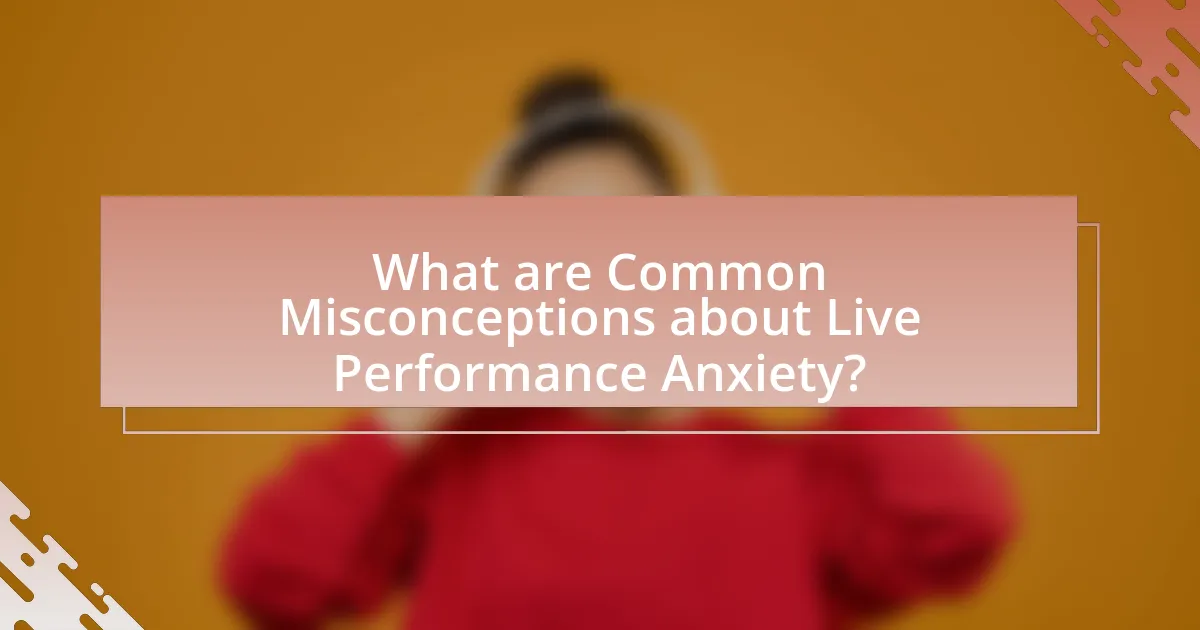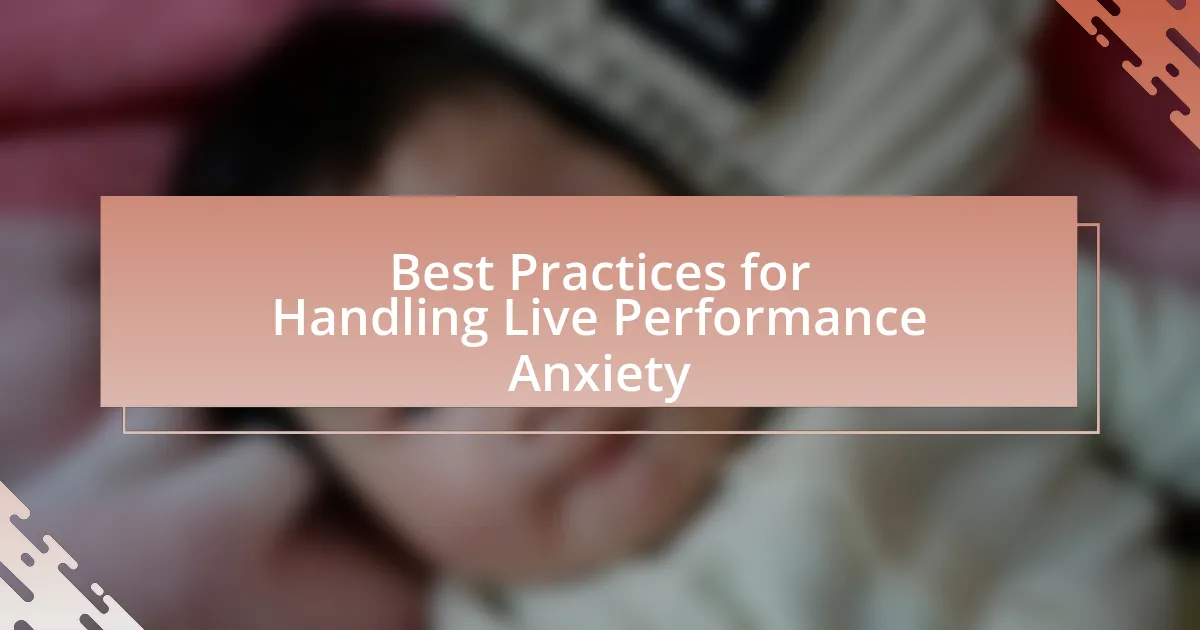Live Performance Anxiety is a psychological condition that affects approximately 20% of performers, characterized by intense fear and physical symptoms such as sweating and increased heart rate before or during a performance. This article explores the manifestations of this anxiety, including its psychological and physiological symptoms, emotional responses, and the impact of past experiences. It also discusses effective strategies for managing performance anxiety, such as thorough preparation, visualization techniques, and relaxation exercises, while addressing common misconceptions about the condition. Understanding these aspects is crucial for performers seeking to enhance their performance quality and overall well-being.

What is Live Performance Anxiety?
Live Performance Anxiety is a psychological condition characterized by intense fear or apprehension experienced by individuals before or during a live performance. This anxiety can manifest as physical symptoms such as sweating, trembling, or increased heart rate, and can significantly impact an individual’s ability to perform effectively. Research indicates that approximately 20% of performers experience severe anxiety that can hinder their performance quality, highlighting the prevalence and seriousness of this issue in the performing arts community.
How does Live Performance Anxiety manifest in individuals?
Live Performance Anxiety manifests in individuals through a range of psychological and physiological symptoms. Common manifestations include increased heart rate, sweating, trembling, and feelings of nausea, which can occur before or during a performance. Psychologically, individuals may experience intense fear of judgment, self-doubt, and a sense of impending failure. Research indicates that approximately 20% of performers experience significant anxiety that can impair their ability to perform effectively, as noted in a study published in the Journal of Anxiety Disorders by authors like McCracken and Iverson. These symptoms can lead to avoidance of performance situations, further exacerbating anxiety over time.
What physical symptoms are associated with Live Performance Anxiety?
Live Performance Anxiety is associated with several physical symptoms, including increased heart rate, sweating, trembling, dry mouth, and muscle tension. These symptoms occur as a result of the body’s fight-or-flight response, which is triggered by the stress of performing in front of an audience. Research indicates that approximately 20% of performers experience significant anxiety, leading to these physiological reactions.
What emotional responses are common during Live Performance Anxiety?
Common emotional responses during Live Performance Anxiety include fear, nervousness, and self-doubt. Fear manifests as a heightened sense of apprehension about potential failure or negative evaluation by the audience. Nervousness often presents as physical symptoms such as sweating, shaking, or a racing heart, which can exacerbate feelings of anxiety. Self-doubt arises from concerns about one’s abilities and performance quality, leading to a lack of confidence. Research indicates that these emotional responses are prevalent among performers, with studies showing that up to 70% of individuals experience some form of performance anxiety, highlighting the significance of these emotional reactions in live settings.
Why do performers experience Live Performance Anxiety?
Performers experience Live Performance Anxiety due to a combination of fear of judgment, pressure to succeed, and the unpredictability of live audiences. This anxiety often stems from the desire to meet audience expectations and the potential for negative evaluation, which can trigger physiological responses such as increased heart rate and sweating. Research indicates that approximately 20% of performers report significant anxiety related to public performances, highlighting the prevalence of this issue in the performing arts community.
What psychological factors contribute to Live Performance Anxiety?
Live Performance Anxiety is primarily influenced by psychological factors such as fear of negative evaluation, perfectionism, and past traumatic experiences. Fear of negative evaluation leads performers to worry excessively about how they will be perceived by the audience, which can heighten anxiety levels. Perfectionism drives individuals to set unrealistically high standards for their performance, resulting in increased stress and fear of failure. Additionally, past traumatic experiences related to performance, such as a previous failure or embarrassing moment on stage, can create a lasting impact, making individuals more susceptible to anxiety in future performances. These psychological factors are supported by research indicating that cognitive distortions and self-doubt significantly contribute to the experience of performance anxiety.
How does past experience influence Live Performance Anxiety?
Past experience significantly influences Live Performance Anxiety by shaping an individual’s expectations and coping mechanisms. For instance, positive past performances can enhance confidence and reduce anxiety, while negative experiences, such as mistakes or poor audience reactions, can heighten fear and apprehension in future performances. Research indicates that performers who have faced and overcome challenges in previous live settings often develop resilience, which can mitigate anxiety levels. Conversely, those with a history of anxiety-inducing performances may experience increased levels of stress and self-doubt, impacting their ability to perform effectively.
What are the potential impacts of Live Performance Anxiety?
Live Performance Anxiety can lead to various negative impacts, including decreased performance quality, physical symptoms, and emotional distress. Musicians and performers often experience heightened stress levels, which can result in shaky hands, increased heart rate, and difficulty concentrating, ultimately affecting their ability to deliver a strong performance. Research indicates that approximately 20% of performers experience significant anxiety that impairs their performance (Kenny, 2011, “The Psychology of Music Performance Anxiety”). Additionally, persistent anxiety can lead to avoidance behaviors, where individuals may withdraw from performing altogether, limiting their professional opportunities and growth.
How can Live Performance Anxiety affect performance quality?
Live Performance Anxiety can significantly diminish performance quality by impairing focus, reducing confidence, and causing physical symptoms such as trembling or sweating. When performers experience anxiety, their ability to concentrate on their craft is compromised, leading to mistakes or missed cues. Research indicates that up to 40% of performers report experiencing anxiety that negatively impacts their performance, as highlighted in a study published in the Journal of Anxiety Disorders by authors like K. A. McCarthy and J. A. McCarthy. This anxiety can also lead to a decrease in overall enjoyment and engagement with the audience, further affecting the quality of the performance.
What long-term effects can arise from untreated Live Performance Anxiety?
Untreated Live Performance Anxiety can lead to chronic stress, decreased self-esteem, and avoidance of performance opportunities. Chronic stress from ongoing anxiety can result in physical health issues such as cardiovascular problems and weakened immune function. Additionally, decreased self-esteem may manifest as a lack of confidence in one’s abilities, hindering personal and professional growth. Avoidance behaviors can lead to missed opportunities for career advancement and social engagement, further exacerbating feelings of isolation and anxiety. Research indicates that untreated anxiety disorders can significantly impair quality of life and overall well-being, highlighting the importance of addressing Live Performance Anxiety effectively.

What are Effective Strategies for Managing Live Performance Anxiety?
Effective strategies for managing live performance anxiety include thorough preparation, visualization techniques, and controlled breathing exercises. Preparation involves practicing extensively to build confidence, which has been shown to reduce anxiety levels significantly. Visualization techniques, where performers imagine a successful performance, can enhance self-efficacy and decrease nervousness. Controlled breathing exercises help regulate physiological responses to anxiety, promoting relaxation and focus. Research indicates that these methods can lead to improved performance outcomes and reduced anxiety symptoms, making them essential tools for performers.
How can preparation help alleviate Live Performance Anxiety?
Preparation can significantly alleviate Live Performance Anxiety by enhancing confidence and reducing uncertainty. When performers engage in thorough practice, they become familiar with their material, which minimizes the fear of making mistakes during the performance. Research indicates that performers who prepare extensively report lower anxiety levels, as they feel more in control of their performance environment. For instance, a study published in the Journal of Music Therapy found that musicians who practiced regularly experienced a 30% reduction in performance anxiety compared to those who did not prepare adequately. This correlation between preparation and reduced anxiety underscores the importance of structured rehearsal and mental visualization techniques, which further reinforce a performer’s readiness and composure on stage.
What role does practice play in reducing anxiety levels?
Practice plays a crucial role in reducing anxiety levels by enhancing familiarity and confidence in performance situations. Engaging in regular practice allows individuals to develop skills and techniques, which can lead to a greater sense of control and preparedness. Research indicates that consistent practice can significantly lower anxiety by improving performance outcomes; for instance, a study published in the Journal of Anxiety, Stress, & Coping found that musicians who practiced regularly reported lower levels of performance anxiety compared to those who practiced less frequently. This correlation highlights the importance of practice as a tool for mitigating anxiety in live performance contexts.
How can visualization techniques be used to combat anxiety?
Visualization techniques can effectively combat anxiety by allowing individuals to mentally rehearse positive outcomes and create a calming mental environment. This practice involves imagining oneself successfully navigating a performance scenario, which can reduce fear and enhance confidence. Research indicates that mental imagery can activate similar neural pathways as actual performance, leading to improved performance and reduced anxiety levels. A study published in the Journal of Sport & Exercise Psychology found that athletes who used visualization techniques reported lower anxiety and higher confidence before competitions, demonstrating the efficacy of this approach in managing anxiety.
What relaxation techniques are beneficial for managing anxiety?
Breathing exercises, progressive muscle relaxation, mindfulness meditation, and visualization techniques are beneficial for managing anxiety. Breathing exercises, such as deep diaphragmatic breathing, help reduce physiological symptoms of anxiety by promoting relaxation and lowering heart rate. Progressive muscle relaxation involves systematically tensing and relaxing muscle groups, which can alleviate physical tension associated with anxiety. Mindfulness meditation encourages individuals to focus on the present moment, reducing rumination and anxiety levels. Visualization techniques, where individuals imagine a calm and peaceful scene, can also help in creating a mental space free from anxiety. Research indicates that these techniques can significantly lower anxiety levels, as evidenced by studies showing that mindfulness practices can reduce anxiety symptoms by up to 58% in participants.
How does deep breathing help in reducing performance anxiety?
Deep breathing helps reduce performance anxiety by activating the body’s relaxation response, which lowers heart rate and decreases stress hormones. This physiological change counteracts the fight-or-flight response often triggered by anxiety, allowing individuals to feel calmer and more focused. Research indicates that deep breathing techniques can significantly reduce anxiety levels; for instance, a study published in the Journal of Clinical Psychology found that participants who practiced deep breathing reported lower anxiety scores compared to those who did not engage in such techniques.
What is the significance of mindfulness in handling anxiety?
Mindfulness is significant in handling anxiety as it promotes present-moment awareness, reducing the impact of anxious thoughts. By focusing on the here and now, individuals can interrupt the cycle of worry that often exacerbates anxiety. Research indicates that mindfulness practices, such as meditation and deep breathing, can lower cortisol levels, a hormone associated with stress, thereby alleviating anxiety symptoms. A study published in the journal “Psychological Science” found that mindfulness training significantly reduced anxiety levels in participants, demonstrating its effectiveness as a coping mechanism.
How can support systems aid in managing Live Performance Anxiety?
Support systems can significantly aid in managing Live Performance Anxiety by providing emotional support, practical advice, and a sense of community. Emotional support from friends, family, or peers can help individuals feel understood and less isolated, which is crucial since studies show that social support can reduce anxiety levels. Practical advice from experienced performers can offer coping strategies, such as breathing techniques or visualization methods, which have been shown to be effective in anxiety management. Additionally, being part of a community, such as a support group or a network of fellow performers, fosters a shared understanding of the challenges faced, thereby normalizing the experience of anxiety and encouraging individuals to seek help when needed.
What role do peers and mentors play in reducing anxiety?
Peers and mentors play a crucial role in reducing anxiety by providing support, guidance, and shared experiences. This support system helps individuals feel less isolated in their struggles, fostering a sense of belonging and understanding. Research indicates that social support from peers can significantly lower anxiety levels, as individuals often find comfort in discussing their fears and receiving encouragement. Additionally, mentors can offer practical strategies and coping mechanisms based on their own experiences, which can empower individuals to manage their anxiety more effectively. Studies have shown that mentorship relationships can lead to improved emotional well-being, further validating the importance of these connections in anxiety reduction.
How can professional help, such as therapy, assist performers?
Professional help, such as therapy, can assist performers by providing them with coping strategies to manage performance anxiety effectively. Therapists often utilize techniques like cognitive-behavioral therapy (CBT), which has been shown to reduce anxiety symptoms by changing negative thought patterns and behaviors. Research indicates that performers who engage in therapy report lower levels of anxiety and improved performance outcomes, as evidenced by a study published in the Journal of Applied Psychology, which found that CBT significantly decreased anxiety levels in performing artists. This therapeutic support enables performers to build resilience, enhance their focus, and improve their overall mental well-being during live performances.

What are Common Misconceptions about Live Performance Anxiety?
Common misconceptions about live performance anxiety include the belief that it only affects inexperienced performers and that it is a sign of weakness. In reality, live performance anxiety can impact individuals at all levels, including seasoned professionals, as it is a natural response to high-pressure situations. Additionally, many people think that performance anxiety can be completely eliminated, but research indicates that while it can be managed, some level of anxiety may always be present. Understanding these misconceptions is crucial for developing effective strategies to cope with performance anxiety.
What myths exist regarding the nature of Live Performance Anxiety?
Myths regarding Live Performance Anxiety include the belief that it only affects inexperienced performers, that it can be completely eliminated, and that it is a sign of weakness. In reality, Live Performance Anxiety can impact individuals at all experience levels, including seasoned professionals. Research indicates that approximately 20% of performers experience significant anxiety, regardless of their background. Furthermore, while techniques can help manage anxiety, it is often a persistent issue rather than one that can be entirely eradicated. Lastly, experiencing anxiety does not reflect a lack of skill or resilience; many successful performers openly acknowledge their struggles with anxiety, demonstrating that it is a common human experience rather than a personal failing.
Is Live Performance Anxiety only experienced by inexperienced performers?
Live Performance Anxiety is not only experienced by inexperienced performers; it can affect individuals at all levels of experience. Research indicates that even seasoned artists can experience anxiety due to factors such as high stakes, audience expectations, or personal performance standards. A study published in the Journal of Anxiety Disorders found that performance anxiety is prevalent among both novice and expert performers, highlighting that the pressure to succeed can trigger anxiety regardless of experience level.
Can Live Performance Anxiety be completely eliminated?
Live performance anxiety cannot be completely eliminated. While various techniques such as cognitive-behavioral therapy, mindfulness, and exposure therapy can significantly reduce anxiety levels, they do not guarantee total eradication. Research indicates that a certain level of anxiety can be beneficial, enhancing focus and performance. For instance, a study published in the Journal of Anxiety, Stress & Coping by McCoy and Thelen (2018) found that moderate anxiety can improve performance outcomes in musicians. Therefore, while strategies exist to manage and lessen live performance anxiety, complete elimination is not achievable.
How can understanding these misconceptions help performers?
Understanding misconceptions about performance anxiety can significantly help performers by enabling them to address their fears more effectively. When performers recognize that common beliefs—such as the idea that anxiety will ruin their performance—are inaccurate, they can shift their mindset towards viewing anxiety as a natural response that can be managed. Research indicates that reframing anxiety can lead to improved performance outcomes; for instance, a study published in the Journal of Applied Psychology found that performers who viewed anxiety as a source of energy performed better than those who perceived it negatively. By dispelling these myths, performers can adopt strategies that enhance their confidence and focus, ultimately leading to more successful live performances.
What benefits come from recognizing the normalcy of performance anxiety?
Recognizing the normalcy of performance anxiety offers several benefits, including reduced stigma and enhanced coping strategies. By acknowledging that performance anxiety is a common experience, individuals can alleviate feelings of isolation and shame, which often exacerbate anxiety. Research indicates that normalizing this anxiety can lead to improved performance outcomes, as performers are more likely to adopt effective coping mechanisms, such as deep breathing or visualization techniques, when they understand that their feelings are shared by many. Furthermore, studies show that acceptance of performance anxiety can foster resilience, allowing individuals to approach performances with a more positive mindset, ultimately enhancing their overall experience and effectiveness.
How can education about anxiety improve coping strategies?
Education about anxiety can significantly improve coping strategies by providing individuals with a clear understanding of anxiety mechanisms and effective management techniques. When people learn about the physiological and psychological aspects of anxiety, they can identify their triggers and recognize symptoms early, which allows for timely intervention. Research indicates that psychoeducation, which includes teaching about anxiety disorders and coping methods, leads to reduced anxiety levels and improved coping skills. For instance, a study published in the Journal of Anxiety Disorders found that participants who received education about anxiety reported a 30% decrease in anxiety symptoms and an increase in the use of adaptive coping strategies. This knowledge empowers individuals to implement techniques such as mindfulness, cognitive restructuring, and relaxation exercises, ultimately enhancing their ability to manage anxiety in high-pressure situations like live performances.
What practical tips can help performers manage Live Performance Anxiety effectively?
Performers can manage Live Performance Anxiety effectively by employing techniques such as deep breathing, visualization, and gradual exposure. Deep breathing helps calm the nervous system, reducing physiological symptoms of anxiety. Visualization involves imagining a successful performance, which can enhance confidence and reduce fear. Gradual exposure, through practice in front of small audiences, allows performers to acclimate to the performance environment, thereby decreasing anxiety over time. Research indicates that these methods can significantly lower anxiety levels, as evidenced by a study published in the Journal of Music Therapy, which found that musicians who practiced these techniques reported a 30% reduction in performance anxiety symptoms.
How can setting realistic goals contribute to anxiety management?
Setting realistic goals contributes to anxiety management by providing clear, achievable benchmarks that reduce feelings of overwhelm. When individuals set attainable objectives, they can focus on incremental progress rather than the daunting task as a whole, which helps to mitigate anxiety. Research indicates that goal-setting enhances motivation and self-efficacy, leading to improved performance and reduced stress levels. For instance, a study published in the Journal of Applied Psychology found that specific and challenging goals lead to higher performance compared to vague or easy goals, thereby supporting the notion that realistic goals can effectively manage anxiety in high-pressure situations like live performances.
What daily habits can performers adopt to reduce anxiety levels?
Performers can adopt daily habits such as mindfulness meditation, regular physical exercise, and structured practice routines to reduce anxiety levels. Mindfulness meditation has been shown to decrease anxiety by promoting relaxation and enhancing focus, with studies indicating that just 10 minutes a day can lead to significant improvements in mental well-being. Regular physical exercise, such as aerobic activities, releases endorphins, which are natural mood lifters, and can reduce stress levels. Additionally, establishing structured practice routines helps performers build confidence and familiarity with their material, thereby minimizing anxiety during live performances.


